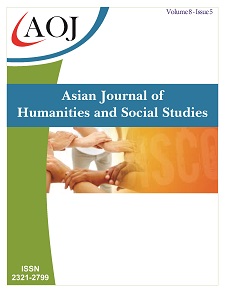Analysis of Satisfaction of University e-Learning Classes
DOI:
https://doi.org/10.24203/ajhss.v8i5.6340Keywords:
: e-learning Class satisfactionAbstract
This study, therefore, aims to propose a direction for the future e-learning class, by analyzing the satisfaction with e-learning class.
It also administered questionnaires to 96 freshmen at universities located in Seoul, from Jun. 22 to Jun. 30, 2020, and used a total of 92 copies in the finally analysis. From the findings above, following suggestions for the quality improvement of e-learning class in general universities can be summarized:
First, it needs to prioritize the establishment of stable and available e-learning systems in schools. Second, professors should quickly adapt to e-learning class, a new paradigm of education. Third, student should primarily acquire basic abilities to use computers, recognize that self-directed learning is the core of university education and make effort to escape from learning by rote, which had been conducted from elementary to high schools. In addition, they should reasonably judge what a method is desirable for enhancing their learning performance.
References
• Kang Myung-hee (2002), “Analysis of Class Effect Factors in Web-based Virtual Classes in Parallel University Practical Classes: A Case Study”, Advanced Research, Vol. 13, No. 2
• Seongju Lee, Jaehwan Kwon (2011), The Influence of Online Learning Situation and Learner's Learning Style on Blended Learning Satisfaction, Journal of Internet Information Society, Vol. 12, No. 6
• Lee In-sook. (2002).「e-learning-a new paradigm in cyberspace」. Seoul: Mooneumsa.
• Daeyul Jeong and Ki Jeon (2002), "A Study on the Instructor's Demand Analysis for Establishing the Strategic Plan for the Virtual University System: Focusing on the Case of K University" Research in Management Information Science, Vol. 4, No. 1
• In-Keun Jung·Jeong-Yong Jo (2004). On the factors affecting satisfaction and affinity of e-Learning 「Korea Management Information Society Spring Academic College Journal of thesis」, 3-9
• Jeong In-seong. (1997). Development of an online virtual university model based on constructivism. 「Educational Engineering Research」, 13(2):315-338.
• Jae-sam Jung and Gyu-Yeon Lim. (2000) Regarding learners' participation, achievement, and satisfaction in web-based discussions Analysis of the effects of factors. 「Educational Engineering Research」, 16(2):107-135
• Choi Kwang-shin and No Jin-deok (2002). Moderating Effects of Interaction between Student and Teacher= A Study on Learning, System, and Administrative Variables Influencing Students' Satisfaction in Cyber-Education Focusing on the effect of interaction with professors and professors. Journal of Korean Information Strategy Society, 5(2): 23-52.
• Tae-in Han and Deok-Hoon Kwak. (2006).「E-Learning You-Learning」. Seoul: Korea Industry-Academic Cooperation Complex
• Ministry of Trade, Industry and Energy, Information and Communication Industry Promotion Agency (2015). 2015 e-learning industry survey. Chungcheong: Information and Communication Industry Promotion Agency.
Downloads
Published
Issue
Section
License
Copyright (c) 2020 Youngmi Moon

This work is licensed under a Creative Commons Attribution-NonCommercial 4.0 International License.
- Papers must be submitted on the understanding that they have not been published elsewhere (except in the form of an abstract or as part of a published lecture, review, or thesis) and are not currently under consideration by another journal published by any other publisher.
- It is also the authors responsibility to ensure that the articles emanating from a particular source are submitted with the necessary approval.
- The authors warrant that the paper is original and that he/she is the author of the paper, except for material that is clearly identified as to its original source, with permission notices from the copyright owners where required.
- The authors ensure that all the references carefully and they are accurate in the text as well as in the list of references (and vice versa).
- Authors retain copyright and grant the journal right of first publication with the work simultaneously licensed under a Attribution-NonCommercial 4.0 International that allows others to share the work with an acknowledgement of the work's authorship and initial publication in this journal.
- Authors are able to enter into separate, additional contractual arrangements for the non-exclusive distribution of the journal's published version of the work (e.g., post it to an institutional repository or publish it in a book), with an acknowledgement of its initial publication in this journal.
- Authors are permitted and encouraged to post their work online (e.g., in institutional repositories or on their website) prior to and during the submission process, as it can lead to productive exchanges, as well as earlier and greater citation of published work (See The Effect of Open Access).
- The journal/publisher is not responsible for subsequent uses of the work. It is the author's responsibility to bring an infringement action if so desired by the author.


